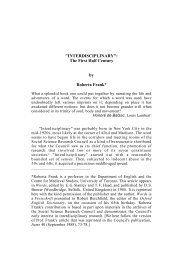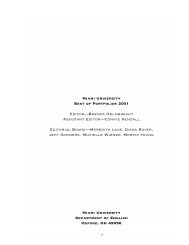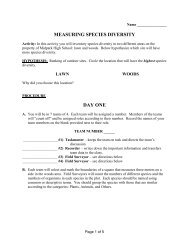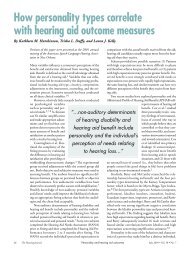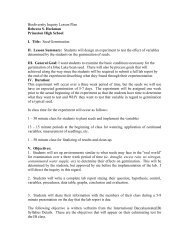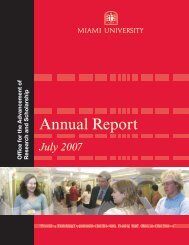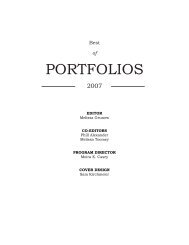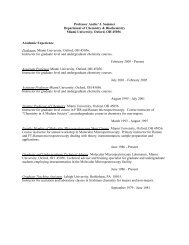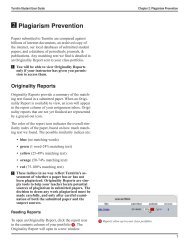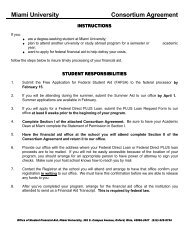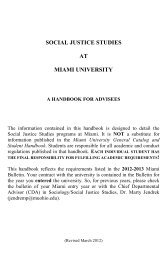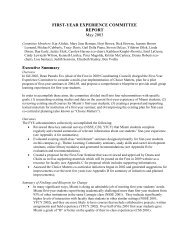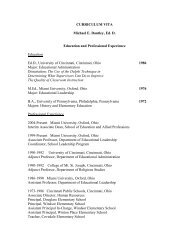Interdisciplinary Research Manual - Units.muohio.edu
Interdisciplinary Research Manual - Units.muohio.edu
Interdisciplinary Research Manual - Units.muohio.edu
You also want an ePaper? Increase the reach of your titles
YUMPU automatically turns print PDFs into web optimized ePapers that Google loves.
57<br />
Common Writing Errors. Quotes need interpretation and application to your<br />
argument, since they have been taken out of another context. Never string quotes together<br />
without intervening interpretation and integration. Normally, long quotes should be<br />
broken up so that you can integrate the points one-by-one into your argument. Unless the<br />
long quote has unusual coherence, if you try to integrate it into your argument you will<br />
end up either repeating individual points anyway or the integration will be crude because<br />
it’s too imprecise.<br />
Paragraphs group clusters of ideas together, clarifying the steps in your line of<br />
reasoning. A paragraph of over half a page is a long paragraph. If a paragraph is over a<br />
page long is definitely too long: it suggests a lack of clarity in those steps.<br />
The first time you use an abbreviation, write out the word and put the<br />
abbreviation in parentheses after it; e.g., “the Environmental Protection Agency (EPA).”<br />
If it’s been a couple chapters since you used an abbreviation that’s unfamiliar to most<br />
readers, it’s a nice gesture to write it out again.<br />
Keep verb tenses consistent. (The best way is to go back and check tenses after<br />
completing a chapter.) For past action that continues into the present, or for timeless<br />
action (a statement about gravity or Buddhism), use the present tense.<br />
You should use language that does not inadvertently exclude categories of people<br />
who should be included (i.e., non-sexist language), but nouns and their pronouns must<br />
still agree in number. Using “his or her” is awkward, so it’s usually preferably to make<br />
the noun plural instead; e.g., “<strong>Research</strong>ers must understand the different methods<br />
available to them” not “The researcher must understand the different methods available to<br />
him or her” (and certainly not “Ask any musician and they will tell you”).<br />
Write out the numbers “one” to “twenty” when they are in a verbal, not a<br />
numerical, context.<br />
Write out the numbers of centuries; e.g., “twentieth century” not “20 th century.”<br />
For quotes four full lines or longer, you must use block quote format: singlespace,<br />
indent, remove the surrounding quotation marks, and move the citation to after the<br />
period. For quotations less than three full lines long, you cannot use block quote format.<br />
In between, it’s up to you. (Some style manuals, e.g. MLA, may direct you to doublespace<br />
block quotes, but they are presuming that a production team will eventually assist<br />
you in putting your manuscript in final form (which includes single-spacing block<br />
quotes). Since you are a production team of one, you might as well put your project in<br />
final form as you go, so single-space block quotes to begin with.<br />
Add another adjective only if the first adjective doesn’t capture your full meaning.<br />
Don’t add a second (or third) adjective that says pretty much the same thing; e.g., delete<br />
either “useful” or “critical” in “Sustainable development may yet prove useful and critical<br />
to the survival of Latin America.”<br />
It makes a difference whether you place the adverb before or after the verb. “The<br />
mural movement was born simultaneously in cities across the country” refers to multiple<br />
births of a movement, whereas “The mural movement was simultaneously born in cities<br />
across the country” suggests that it was more than just “born” in those cities; the reader<br />
expects, for example, “and died” after “born.”<br />
Use “few” (or “many”) when you can count them and “little” (or “much”) when<br />
you cannot; e.g., “few tigers” but “little effect.” Similarly, use “number” when you can



